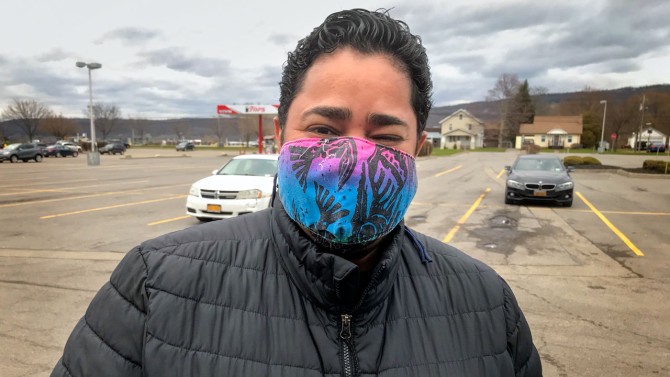The Cornell Farmworker Program’s Director Mary Jo Dudley describes the collaboration with partners across the state – volunteers, health clinics, veterinarians, community organizations – to make sure that farmworkers are provided with protective face masks.
Program delivers masks, COVID-19 info for NY farmworkers
By Kelly Merchan
More than 55,000 farmworkers across New York play critical roles sustaining the local and global food supply.
Many of these essential workers – who often live in close quarters and work side by side – have continued to work without face masks, despite the COVID-19 pandemic. To help protect farmworkers and slow the virus’s spread in rural New York, the Cornell Farmworker Program is mobilizing local support to make and distribute face masks across the state.
“Farmworkers are essential to our health in good times and even more so during a crisis like this,” said Mary Jo Dudley, director of the Cornell Farmworker Program in the College of Agriculture and Life Sciences’ (CALS) Department of Global Development. “By working together with our local and statewide network, we have a chance to slow the spread of this pandemic in rural New York and protect our most vulnerable populations.”
Since March 15, when the initiative began, volunteers have handsewn more than 1,400 cloth masks for New York farmworkers. Health clinics, veterinarians, community organizations and others are all lending a hand in the distribution effort. Local volunteer groups – in particular Bryant Mask Makers, coordinated by Andy Ruina, the John F. Carr Professor of Mechanical Engineering – joined forces in an effort to make 1,000 masks in two weeks.
Additionally, Cornell students who’ve engaged with farmworkers through the program have made 300 masks from their homes across the country and mailed them to the farmworker program.
“The farmworkers in upstate New York, and undocumented individuals in general, have been really present in my thoughts during this pandemic,” said Matt Ponticiello ’21, a global and public health sciences major in CALS and a member of Friends of Farmworkers, the student group that tutors immigrant farmworkers.
Faculty, staff, students and community volunteers associated with the Cornell Farmworker Program are working with partners to coordinate delivery to farmworkers and local farms. Those deliveries include information on where and how to access local health resources, and how to join a Q&A call with a medical doctor.
So far, the program has helped distribute masks in rural communities across the state. Health clinics in the local communities play a critical role by making the deliveries in full protective gear, while sharing health information and administering COVID-19 tests.
The Cornell Farmworker Program’s success in coordinating the effort, Dudley said, can be attributed to decades of building trust and strengthening relationships with farmworkers and local farms across the state. In addition to making masks, the program is hosting weekly informational webinars, in both English and Spanish.
In April, the program partnered with Finger Lakes Community Health to offer COVID-19 education, in English and Spanish, reaching nearly 1,000 farmworkers each week. The program provides health updates by texting its network of 2,500 Spanish-speaking farmworkers, and including links to videos and other useful information that are designed for low-literacy populations.
The program also offers materials in indigenous languages, such as the Mayan language Mam, as Spanish is a second language for some. The farmworkers are also encouraged to submit questions via text to Dr. Jose Canario, medical director of Finger Lakes Community Health, who offers responses in the webinar series.
“It is so uplifting to have the support of the broader community during this crisis,” said Dudley. “This will be an ongoing effort and we welcome the continued support of volunteers.”
Those interested in making masks or getting involved can email farmworkers@cornell.edu.
Kelly Merchan is a communications specialist in the Department of Global Development.
Media Contact
Get Cornell news delivered right to your inbox.
Subscribe


